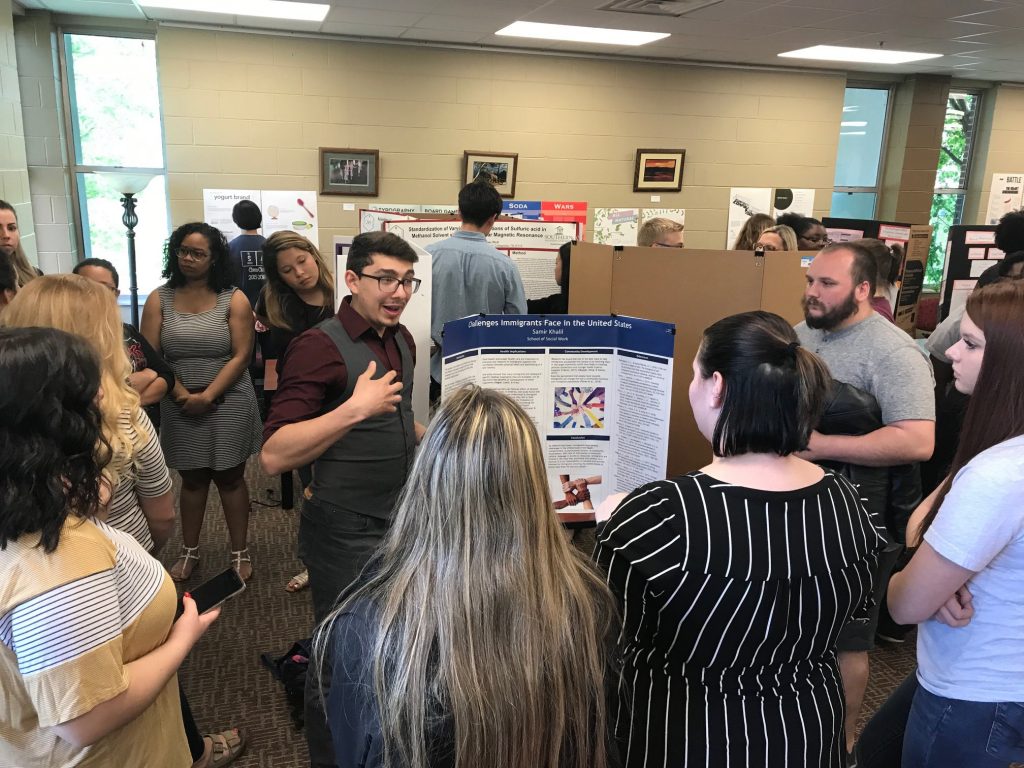Engage in Practice-Informed Research and Research-Informed Practice
Practice Behaviors:
4.1 – Use practice experience and theory to inform scientific inquiry and research.
4.2 – Apply critical thinking to engage in the analysis of quantitative and qualitative research methods and research findings.
4.3 – Use and translate research evidence to inform and improve practice, policy, and service delivery.
The saying, “Knowledge is power,” summarizes how important it is to always keep learning. As a profession, social work has used research to give it legitimacy while also providing evidence-based solutions to issues that clients face. Yet, social work does not want knowledge for the sake of knowledge. The goal is always client-focused. As a professional, I will continue to research more efficient and effective intervention methods to help my clients.
Evidence 1 (Class): There have been several classes in which we have had to conduct reseach. One of these classes was Human Behavior and the Social Environment II (SOCW-312). For my literature review, I focused on the different challenges that immigrants faced in the United States. My reseach found three main areas that affected immigrants. I used a variety of qualitative and quantitative studies to explore this topic more thoroughly. To learn more about this assignment, click here.
Evidence 2 (Field): Since my practicum works with refugees, I wanted to learn more about the population I would be working with. An inquiry that I had about refugees was how well they integrate into American society. I used several qualitative research journals and some quantitative studies that helped to paint a larger picture of how refugees fared once they arrived in the United States. One of the findings that were repeated in several of the articles was that there is no centralized database with information about refugees. To view my journal entry for this evidence, click here and see week 3.
 Evidence 3 (Additional): After completing my literature review, I was able to present my findings to Southern Adventist University during their Campus Reseach Day event. I met with students, professors, community members, and classmates to discuss the implications that my research has within the realm of social work. The importance of research is that it is shared and can be used practically. To view my poster presentation, click here.
Evidence 3 (Additional): After completing my literature review, I was able to present my findings to Southern Adventist University during their Campus Reseach Day event. I met with students, professors, community members, and classmates to discuss the implications that my research has within the realm of social work. The importance of research is that it is shared and can be used practically. To view my poster presentation, click here.
Skills Used: One of the main skills that I used for this competency was writing skills that I learned in my English Composition I & II classes (ENGL-101/102), Human Behavior and the Social Environment I & II (SOCW-311/312), C.S. Lewis (ELIT-340), and many others. I was able to also use my communication skills to present my research findings that I learned from my Communication and Public Speaking (COMM-135) class.
Knowledge Used: Some of the skills that were utilized for this competency was learned in Human Behavior and the Social Environment I & II (SOCW-311/312). In this class, I learned how to write and organize a literature review. I also used knowledge from my English Composition II class (ENGL-102) to be able to find sources effectively using McKee’s databases, research coaches, writing tutors.
Values Presented: For each of these pieces of evidence, one of the main social work values present is the value of competency. One way that competence plays into my literature review is that I needed to put the effort and energy to do the research to learn more about my topic. The same goes for my practicum. To be able to do my work efficiently, I need to do the research to develop my professional skills to better assist my clients.
Cognitive Processes Used: For my presentation during campus research day, I needed to organize my findings in a clear and concise manner to be able to present it to those who came by my booth. I was also able to draw conclusions based on my findings.
Affective Processes Used: With the research that I conducted in my practicum, I was able to integrate the findings into my practice with refugees. I was also able to internalize the importance of research in terms of service delivery to clients and constituents.
Theoretical Foundation: Schema is a mental structure that people use to help them organize and understand information and knowledge more efficiently. Within my practicum and academic life, I have utilized schema to be able to interpret research related to service delivery.
